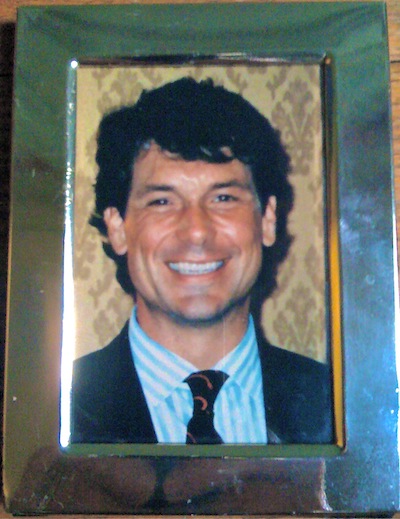On the 20th of November it will be 20 years since my brother Brent died, and my heart cracked open and bled away. The life leaked out of me as he took his last breath. It was after a few hours during which Brent struggled to live -- or was it to let himself go? -- that the rattle of death surged through him. I begged him to stay on this earth. But Brent was as elegant in his last moments as he had been his entire life.
My brother was handsome, brilliant, and charming, fantastic fun for anyone who followed him -- he was a Pied Piper of lost and lonely souls, as well as for all others. He was clever, generous, and kind, lapping up life as if he were a fine Cheshire cat drinking Triple Cream. Life was a wonderland of adventure for Brent, and that didn't stop until the air seeped out of him forever.
I didn't want to let him go. I thought I couldn't live without him, knew I would die when he did -- or at least the part of me that was the core of my identity would forever disappear. He was my memory as well, and I would mourn Brent for the rest of my life. I knew I would have to learn to live without our daily phone calls, the secrets we confessed, the tears we cried, and laughter we crowed like roosters welcoming the sun. One can never exist in the same way after someone we love more than ourselves leaves us for an eternity we can't see or feel, even if we believe in it.
As siblings who walked through the fire of our father's death as teenagers, we clung to each other for some sense of safety. I was embedded in him as he was in me. Brent and I and our brother, Blair, would always be bonded by the exceptional childhood we were lucky enough to have, and then by the catastrophic ending of it.
One day Brent called me and said you have to read this book, and he sent me The Prince of Tides by Pat Conroy. He was right. Once I started it, I couldn't put it down. I could see why Brent said it was a must-read. The story wasn't our family's story, yet it felt like us exactly, though our family's holocaust wasn't the Callanwolde of Conroy's fine novel but the death of our father when we were ages 16, 15, and 13. Our mother was catapulted into widowhood, when she was only 41. We all suffered beyond repair. That was the blast that blew us apart, and when the damage began that afflcted each of us in our separate ways.
Was this part of the reason that the core of Brent's life was beauty? He was beauty. He graciously gave it to others with his joy in life and his work as a decorator, with what he said and did, how he conducted himself and extended himself to others. He graciously accepted beauty every time he could. He lived and breathed it. He created it. He gave of himself to everyone who knew him, and he wanted to give to his community, state and nation even more. Brent wanted to follow in the footsteps of our father, and run for public office. His intelligence and charisma gave him the skills, and our family's political background gave him the avenue. But he was gay and not willing to live a lie or put someone else through a fraudulent marriage, and at the time there was little other choice.
Brent was lost for a time before he decided to go into the decorating field. But he had the perfect "eye" and could find the most classic, elegant, stylish, shocking, lovely, wonderful piece of decorative art anywhere, whether surrounded by a room full of expensive objects or a pile of junk. Author David Halberstam called Brent "the talent of his generation," which would've pleased him so. Like so many others during the early days of the AIDS horror, his genius was lost to us, even if his light and love could never die. The world lost a multitude of talent, beauty, and hope during those sad years, and the losses from this disease are still in haunting numbers.
Was Brent afraid to die?
Brent and I began our lives made of our family's bone and blood, but we grew into our common history, pain and laughter, and our desire to survive the deepest darkest things within us somewhat intact.
The unsaid truth about grief is it never dies. Oh, yes, the shock eventually subsides, and, sooner or later, each day gets easier to face. Someday, the nightmares go away. Grief quiets down or hides, waiting to find a path to escape, whether that's a movie scene, a written line, a smell, a song, a photo, or looking at a can of green beans. Part of me left with Brent, and it is a part of me that can never be found.
I grieve for Brent, and I honor him. I ordered a bouquet of fresh flowers to be left on his grave. I wish I could have placed them there myself and sung his praise. Brent, I know your spirit lives and soars.

Brent Arnold in Venice
In memory of Robert Brent Arnold, 1956 -- 1990.
Beth Arnold lives and writes in Paris. To see more of her work, go to www.betharnold.com.